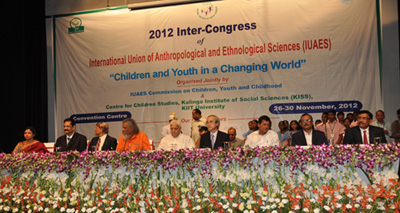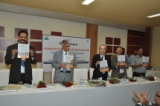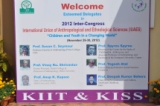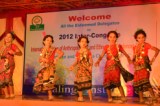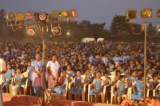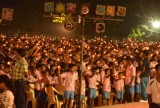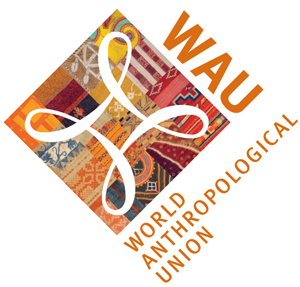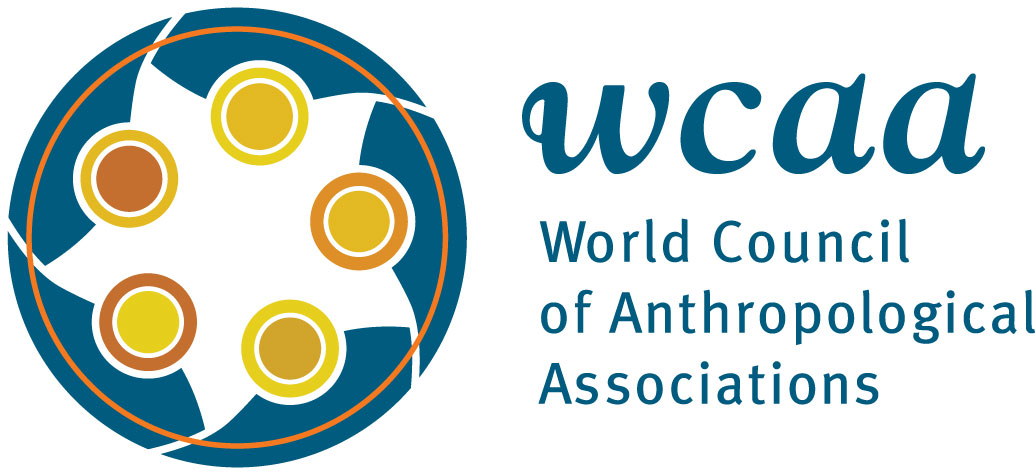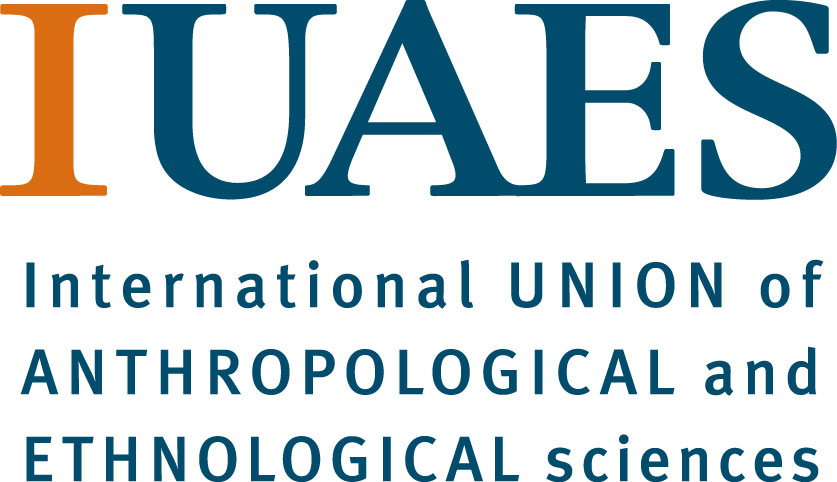
IUAES 2012 India 
Report submitted by
Professor Deepak Kumar Behera and Professor Motilal Dash
Conveners of the IUAES 2012 Inter-congress
REPORT ON 2012 INTER-CONGRESS OF INTERNATIONAL UNION OF ANTHROPOLOGICAL AND ETHNOLOGICAL SCIENCES (IUAES) ON CHILDREN AND YOUTH IN A CHANGING WORLD NOVEMBER 26–30, 2012 AT KIIT UNIVERSITY, BHUBANESWAR
Organized jointly by: IUAES COMMISSION ON ANTHROPOLOGY OF CHILDREN, YOUTH AND CHILDHOOD AND KISS AND KIIT UNIVERSITY
The 2012 Inter-Congress of International Union of Anthropological and Ethnological Sciences (IUAES) on "Children and Youth in a Changing World" was held at KIIT University, Bhubaneswar during November 26-30, 2012 It was jointly organized by the IUAES Commission on Anthropology of Children, Youth and Childhood and Kalinga Institute of Social Sciences, KIIT University. 300 participants from 47 different countries attended the inter-congress.
The Commission on Anthropology of Children, Youth and Childhood was proposed at the International Union of Anthropological and Ethnological Sciences at a meeting of the Executive Committee at the Beijing Inter-Congress in July 2000. The Commission was officially recognized and its work ratified by the Permanent Council of the IUAES at the Göttingen Inter-Congress on 19 July 2001.
The IUAES Commission on Anthropology of Children, Youth and Childhood is a new body that has come together to engender and promote a number of guiding ideals. One of our initial and most important aims and intentions is to encourage research about children in which children are themselves active participants as opposed to being just objects of study as they were most often in the past. If, that is to say, they were studied at all. Close scrutiny of numerous well known anthropological and sociological studies over several decades would reveal the notable absence of children. However, in recent years a growing number of researchers has either studied childhood or included children in the broader picture of society. Youth has generally fared better, although often represented by studies of youth movements, youth culture and complementary topics such as the influence of music, fashion, drugs and so on. We are fortunate in starting at a time when a small but growing body of expertise is proving the value of participatory work with children and youth, thus carrying over skills we have acquired as ethnographers to the greater good of children.
The 2012 IUAES Inter-Congress was the largest conference on "Anthropology of Childhood" in the history of India. We take this opportunity to thank the Executive Committee of IUAES for giving us the opportunity to organise this mega conference in the state of Odisha/India. We hope that this international conference will go a long way in creating an initiative for establishing an "Anthropology of Childhood" as a new sub-discipline within anthropology.
The anthropology of childhood is slowly gaining recognition as an important field of specialization, as children are increasingly seen as social actors in their own right rather than passive recipients of adult instruction and influence. Studies in the anthropology of childhood have succeeded in highlighting the agency of children, as they explore and act upon the conditions of the "adult" world in which they live and of which they have direct experience. Long treated as of minor importance within anthropology, the study of childhood has blossomed in the last decade. Scholars interested in human evolution and development, acknowledge the importance of studying the role of culture and biology in shaping the life course. There is renewed interest in understanding culturally marked transitions and stages in children's development. From analyses of the mothering of the young to the study of rites of passage, both traditional and modern anthropologists are re-examining and overturning many widely held assumptions about human development.
In considering what social agency means to the children and young people themselves, it is important to remember the notion of children as social actors shaping their own circumstances, as opposed to being submissive recipients of the social processes in which they find themselves. Childhood is a cultural construction. Children make meaning for themselves by bringing their own unique form of agency into being. The question of agency cannot even begin to be addressed without due consideration of what social agency means for children and youth themselves. How children come to 'make sense' of kin reckoning, and come to experience forms of "family" socially, including those they bring into being for themselves. It is important to analyse the ways in which children themselves explore and experience their everyday lives in our fast changing society. What are the impacts that the changing face of childhood has for children? People often muse why childhood today seems different than it was when they were young. An important task is an understanding of how the globalised conditions under which children grow up affect 'local' childhoods. The traditional family, which provided emotional security and protection to children, has given way to new forms of family, where home becomes primarily a meeting place for parents and children, a place to take a rest from their busy lives. Further modern technologies have significantly altered children's lifestyles. TV culture has dominated the socialisation practices of modern societies replacing much of the influence that the family and school used to have. Children's own emotional needs tend to be overlooked when they are drawn prematurely into a troubled adult's world. In understanding the changing nature of childhood, we need to see it in relationship to adulthood. Today, the typical modern child in a modern nuclear family has almost disappeared as the majority of children find themselves with dual-career parents. The once primary value of family togetherness gave way to the value of autonomy where the needs of the individual members are considered most important, and individual competence in both children and parents is valued above all. Scholars interested in human evolution and development, now acknowledge the importance of studying the role of culture and biology in shaping the life course as an important determinant. There is renewed interest in understanding culturally marked transitions and stages in children's development. From analyses of the nurturing of the young to the study of rites of passage, both traditional and modern anthropologists are re-examining and overturning many widely held assumptions about human development.
The Inter-Congress was not confined to anthropology. Rather it provided a dynamic platform to persons from a variety of backgrounds such as anthropologists, sociologists, economists, demographers, civil society, national and international bilateral agencies, policy makers and planners to have dialogues and deliberations on children and youth issues in a changing socio-economic and legal order.
The inaugural ceremony of the inter congress was held in the auditorium at campus–6 of KIIT University. His Excellency Governor of Odisha Sri Muralidhar Chandrakant Bhandare and Dr. Prasana Patasani, Honorable MP of Odisha graced the occasion as the chief guest and guest of honour respectively. The other members on the dais were Dr. A Samant (Founder, KISS and KIIT University), Prof. P. P Mahtur (Vice Chancellor, KIIT University), Dr. Sasmita Samanta (Registrar, KIIT University), Prof. Deepak Kumar Behera, Convener (Chair, Commission on Children, Youth and Childhood), Prof. Motilal Dash (Convener, KISS, KIIT University).
Four members of the Executive Committee of IUAES who attended the Inter-congress were Professor Junji Koizumi (Secretary-General, IUAES, Professor of Anthropology, Osaka University, Japan), Professor Luis Alberto Vargas (Past-president, IUAES, National Autonomous University, Mexico), Professor Soheila Shahshahani (Senior Vice-President IUAES, Shahid Beheshti University, Tehran, Iran), Professor Eisuku Kanazawa (Vice-President IUAES, Nihon University, Japan).
Dr. Samant rightly pointed out that "no other place in India is more suitable than KISS, KIIT University for the 2012 inter congress on the theme "Children and Youth in the Changing World" as more than 16,500 tribal students from KG to PG are getting free education, food and accommodation at KISS/KIIT University. Professor Behera introduced the theme of the conference to the delegates. His Excellency Governor of Odisha in his speech expressed his concern for parental expectation on children and the free access of children to TV and internet.
A recorded keynote address on "Unmasking Children's Agency" was given by Professor David Lancy, Dept. of Anthropology, Utah State University, USA. Five plenary lecturers were delivered by distinguished anthropologists from India and abroad. Professor Spyros Spyrou of Centre for the Study of Childhood and Adolescence, European University Cyprus, delivered a wonderful plenary lecture on "Producing Childhood or What Might a Critical Anthropology of Childhood Look Like". In her plenary lecture Professor Susan Seymour of Dept. of Anthropology, Pitzer College, Claremont, USA spoke on "Women, Family and Childcare in Bhubaneswar, India 1965-1999". Professor Yogesh Atal, Professor, Chair UNESCO delivered his lecture on "Understanding Childhood from an Anthropological Perspective". Professor A.K. Kapoor in his lecture highlighted the "Socio-Psycho and Biological Dynamics of Indian Childhood." Professor Vinoy Srivastava of the Dept. of Anthropology, Delhi University delivered a plenary lecture on "Are Children Individuals?" A total number of 50 parallel sessions on different themes were held during these 5 days of inter congress.
The business meeting of the IUAES Commission of Children, Youth and Childhood was conducted in the evening of the 2nd day of the inter congress. Professor D. K. Behera, Chair, IUAES Commission on Children, Youth and Childhood chaired the session. The meeting was attended by the members of the Executive Committee of IUAES. A total number of 48 members attended the meeting. The new office bearers of the Commission were elected:
Professor Deepak Kumar Behera, Chairperson of the commission
Professor Spyros Spyrou, Centre for the Study of Childhood and Adolescence and European University Cyprus (Executive Secretary of the Commission)
Members of Organising Committee
- Dr. Sudip Datta Banik (India)
- Dr. Andrea Luithle-Hardenberg (Germany)
- Dr. Anand Kumar Singh (South Africa)
- Dr. Grabriela Alexi (Germany)
- Dr. Anandini Dar (USA)
Professor Junji Koizumi, (Secretary-General, IUAES) and Professor Soheila Shahshahani spoke about IUAES and its different commissions. They described the modalities for setting a new commission and becoming a member of the commission.
The Founder of KISS/KIIT University, Dr. Achyut Samant, felicitated all the members of the Executive Committee of IUAES and invited speakers. Four overseas anthropologists who have made significant contribution to anthropology in Odisha were also felicitated. A total number of 22 Indian anthropologists were also felicitated in recognition of their contribution to Indian anthropology.
All the participants of the inter congress visited to Kalinga Institute of Social Sciences (KISS) – the largest residential educational institution for tribal children on the evening of the first day with great interest and enthusiasm. A cultural programme was staged by the children of KISS for the entertainment of the guests. A field trip was organized on the 3rd day of the conference where the participants visited different cultural heritage and tourist places in and around Bhubaneswar and Khurdha. The delegates from the foreign countries were fascinated by the rich cultural heritage and beautiful tourist places of Odisha. The guests were entertained via cultural programme in each evening after the daylong academic sessions and plenary lecturers.
The valedictory session was held in the seminar hall I of the campus 6 of KIIT University in the afternoon of 30th November 2012. Professor Luis Alberto Vargas, Past-president, IUAES, National Autonomous University, Mexico was the chief guest at the valedictory function. The three plenary speakers from India were felicitated by the Vice-Chancellor of KIIT University. Prof. Junji Koujmi thanked the conveners, other members of the organising committee and especially Dr. A Samanta for his support for making the inter congress a successful one. Professor P. P. Mathur unfolded that the mass presence of participants in the valedictory ceremony shows the success of the inter congress. Prof. A Kapoor mentioned that the 2012 inter congress beginning of new history as for the first time the anthropologists were felicitated in such a mega academic event. Professor S. N. Ratha stated that the 2012 inter congress is unique and different because it is a conglomeration of academicians and researchers of all ages starting from the 20 years old fresh students continuing post graduation to 77 years old man like him and also it is a gathering of teachers, their students and grand students in a true sense. Many participants shared their experiences and compliments. Finally Professor Behera and Professor Dash, the conveners of the inter congress conveyed their heartfelt thanks to everyone present starting from the members of the organizing committee to the participants from India and aboard for their active participation, deliberations and making the inter congress a successful one. Professor Behera mentioned that this inter congress is a milestone in the anthropological history of KIIT University and it is not the end but a new beginning…
The following parallel panels were held during the Inter-congress:
- PANEL-01: TEACHING INDIGENOUS CHILDREN
- PANEL-02: CHILDREN IN PATRILINEAL AND MATRILINEAL SOCIETIES
- PANEL-03: GLOBALIZATION AND CHILDHOOD
- PANEL-04: ETHICS AND ETHNOGRAPHY WITH CHILDREN: WHAT CAN ANTHROPOLOGY OFFER
- PANEL-05: RESEARCH ON CHILDREN'S PLAY AND TOYS IN NON-WESTERN OR NON-INDUSTRIAL COMMUNITIES AND ITS CONTRIBUTION TO ANTHROPOLOGY AND ETHNOLOGY
- PANEL-06(A): ETHNOGRAPHY WITH CHILDREN AND ADOLESCENTS: A COMPARATIVE ANALYSIS ACROSS STUDIES AND CONTEXTS
- PANEL-07(A): GROWING UP: HOW GENDER PRAXIS PLAYS A ROLE
- PANEL-8(A): CHILDREN AND YOUTH LIVING IN VIOLENT FAMILIES
- PANEL-9(A): STUDIES OF CHILDREN AND CHILDHOOD IN LATIN AMERICA FROM THE COLONIAL PERIOD TO THE PRESENT
- PANEL-10: ADOLESCENT REPRODUCTIVE AND SEXUAL HEALTH
- PANEL-11(A): CHILDREN'S EXPERIENCE OF SCHOOLS AND CLASSROOMS
- PANEL-12: CROSS-CULTURAL VARIATION IN THE DEVELOPMENT OF THE CHILD'S SENSE OF RESPONSIBILITY
- PANEL-13(A): THE MAKING OF CULTURAL IDENTITY IN THE CASE OF "UNATTACHED" CHILDREN
- PANEL-14 (A): RIGHTS AND SECURITIES OF NATURAL DISASTER AFFECTED CHILDREN
- PANEL-15: MANAGING AND ENHANCING THE HEALTH OF INFANTS AND YOUNG CHILDREN BY OPTIMIZING CARE FOR YOUNG CHILDREN WITH SPECIAL HEALTH CARE NEEDS
- PANEL-16: BELONGING, IDENTITY AND THE CULTURAL POLITICS OF INTER-COUNTRY ADOPTION
- PANEL-17: CHILDHOOD AND THE INNER LIFE
- PANEL-18 (CISCA-SPECIAL PANEL): VISUALIZING CHILDREN
- PANEL-19: CHILDREN ABUSE AND TRAFFICKING IN INDIA: HUMAN RIGHTS EXPLOITATION
- PANEL-20(A): DYNAMICS OF PHYSICAL GROWTH PATTERNS IN VARIED SURROUNDINGS, SOCIO-ECONOMIC RURAL AND URBAN GROUPS
- PANEL-22(A): ANTHROPOLOGICAL PERSPECTIVES ON THE GOVERNANCE OF CHILDREN AND YOUTH IN LATIN AMERICA: MORALITIES, AUTHORITIES AND SUBJECTIVITIES
- PANEL-23: CHILDREN IN DEVELOPMENT: FROM CASE STUDIES TO THE CONSTRUCTION OF A SUBJECT MATTER
- PANEL-25: WORKING WITH YOUTH IN INTERVENTION PROGRAMMES
- PANEL-26: MIGRANT CHILDREN'S CULTURES AND THE CULTURE OF MIGRANT CHILDHOODS
- PANEL-27(A): CHILD, YOUTH AND HUMAN RIGHTS
- PANEL-29(A): ROLE OF REWARD AND PUNISHMENT IN DISCIPLINING THE CHILD
- PANEL-30(A): GROWTH AND NUTRITION: A BIO-CULTURAL SYNTHESIS, WITH SPECIAL REFERENCE TO CHILDREN AND YOUTH
- PANEL-31(A): EFFECT OF SOCIO ECONOMIC STATUS ON THE REPRODUCTIVE HEALTH OF WOMEN
- PANEL-32(A): PERSISTENCE AND CHANGE IN HUNTER-GATHERER INFANT, CHILDREN, AND ADOLESCENT SOCIAL LEANING, PLAY AND PARENTING
- PANEL-33(IAA-SP): GENDER AND CHILDHOOD: ANTHROPOLOGICAL INSIGHTS
- PANEL-34: DEPRIVATION OF EDUCATION FOR CHILDREN
- PANEL-35: YOUTH, SUBSTANCE ABUSE AND HOUSEHOLD RELATIONS
- PANEL-36: STUDIES ON DIFFERENT FACTORS THAT AFFECT THE CHILDREN AND YOUTH IN MEXICO
- PANEL-37: CONTEMPORARY AFRICAN CHILDHOOD: CULTURAL CHANGES AMONG CHILDREN IN WEST AND CENTRAL FRANCOPHONE AFRICA
- PANEL-38: LIFE SKILLS OF CHILDREN AND YOUTH IN GLOBALIZED WORLD
- PANEL-39: SOCIAL AND ECONOMIC PERSPECTIVES OF YOUTH IN MEXICO
- PANEL-41(A): SOCIAL AND POLITICAL LANDSCAPES OF CHANGING CHILDHOODS
- PANEL-42(A): YOUTH IN CHANGING CULTURE AND CONTEXT
- PANEL-43(A): CHILDREN AND YOUTH IN DIFFICULT CIRCUMSTANCES
- PANEL-44(A): SCHOOLING AND CHILDHOODS: PRACTICES, PEDAGOGIES AND POLICIES
- PANEL-45(A): CHILDHOOD AND GENDER BIAS
- PANEL-46(A): CHILDREN AND YOUTH IN A GLOBALISED WORLD
- PANEL-47(A): ECONOMICS OF CHILDHOODS: CHILD LABOUR AND WORKING CHILDREN
- PANEL-48: CHILDREN AND YOUTH: LEADERSHIP AND SKILL DEVELOPMENT
- PANEL-49(A): CHILDREN'S PLAY, RECREATION AND CREATIVITY
- PANEL-50: JUVENILE DELINQUENCY IN CHANGING CONTEXTS
